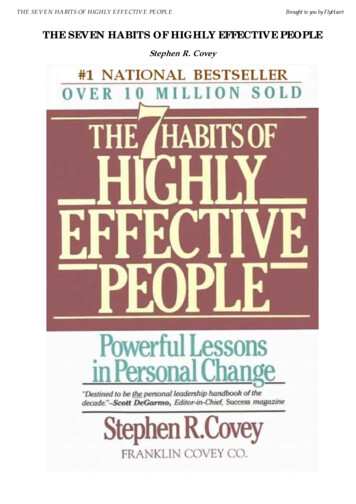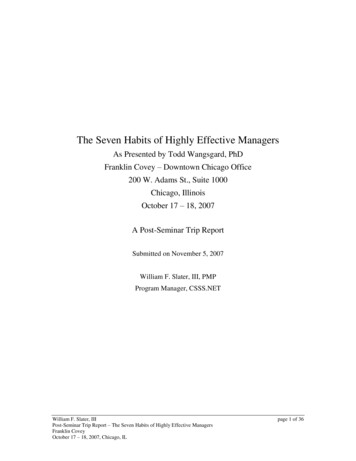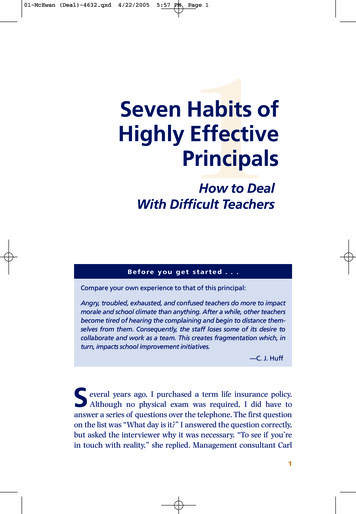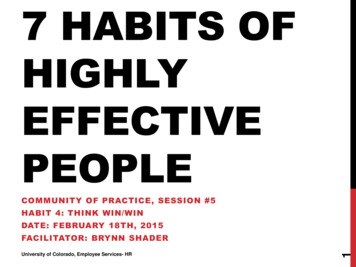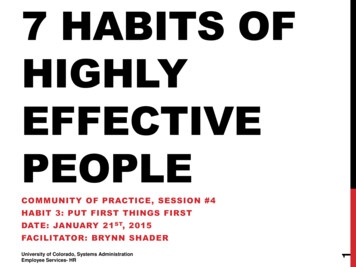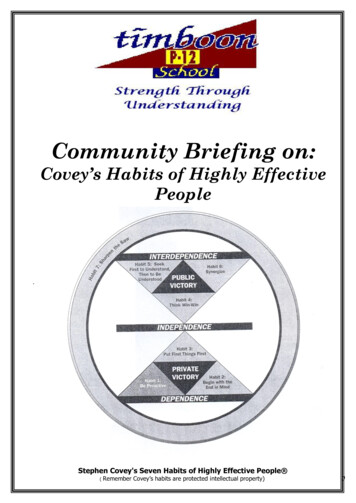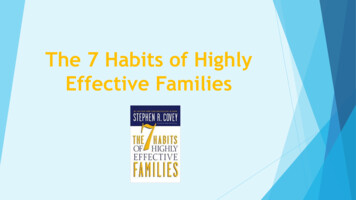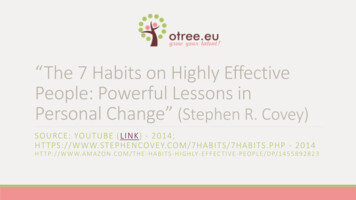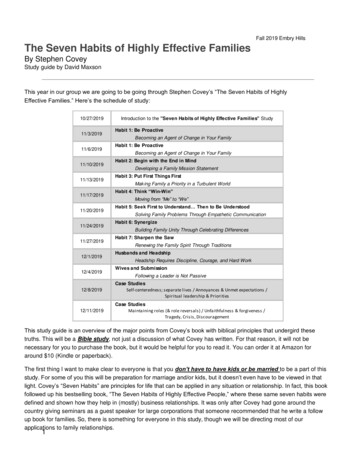
Transcription
Fall 2019 Embry HillsThe Seven Habits of Highly Effective FamiliesBy Stephen CoveyStudy guide by David MaxsonThis year in our group we are going to be going through Stephen Covey’s “The Seven Habits of HighlyEffective Families.” Here’s the schedule of 01912/4/2019Introduction to the "Seven Habits of Highly Effective Families" StudyHabit 1: Be ProactiveBecoming an Agent of Change in Your FamilyHabit 1: Be ProactiveBecoming an Agent of Change in Your FamilyHabit 2: Begin with the End in MindDeveloping a Family Mission StatementHabit 3: Put First Things FirstMak ing Family a Priority in a Turbulent WorldHabit 4: Think “Win-Win”Moving from “Me” to “We”Habit 5: Seek First to Understand Then to Be UnderstoodSolving Family Problems Through Empathetic CommunicationHabit 6: SynergizeBuilding Family Unity Through Celebrating DifferencesHabit 7: Sharpen the SawRenewing the Family Spirit Through TraditionsHusbands and HeadshipHeadship Requires Discipline, Courage, and Hard WorkWives and SubmissionFollowing a Leader is Not Passive12/8/2019Case StudiesSelf-centeredness; separate lives / Annoyances & Unmet expectations /Spiritual leadership & Priorities12/11/2019Case StudiesMaintaining roles (& role reversals) / Unfaithfulness & forgiveness /Tragedy, Crisis, DiscouragementThis study guide is an overview of the major points from Covey’s book with biblical principles that undergird thesetruths. This will be a Bible study, not just a discussion of what Covey has written. For that reason, it will not benecessary for you to purchase the book, but it would be helpful for you to read it. You can order it at Amazon foraround 10 (Kindle or paperback).The first thing I want to make clear to everyone is that you don’t have to have kids or be married to be a part of thisstudy. For some of you this will be preparation for marriage and/or kids, but it doesn’t even have to be viewed in thatlight. Covey’s “Seven Habits” are principles for life that can be applied in any situation or relationship. In fact, this bookfollowed up his bestselling book, “The Seven Habits of Highly Effective People,” where these same seven habits weredefined and shown how they help in (mostly) business relationships. It was only after Covey had gone around thecountry giving seminars as a guest speaker for large corporations that someone recommended that he write a followup book for families. So, there is something for everyone in this study, though we will be directing most of ourapplications to family relationships.1
2019Embry HillsNext, I want to give a strong recommendation to the principles behind these seven habits. FallIt hasbeenover 15 years since I first read this book, and I think I had forgotten how profound it’s influence was onme, not only as a husband and a father, but as a man. This is not a “how to” book. This is a book that challenges youto think introspectively about the fundamental ways you think and respond to problems. It’s about being intentional and“proactive” (chapter 1) and about living by principle and not just by what your emotions and feelings dictate. It’s abouthow we make choices and establishing priorities and about choosing and thus living by a higher calling.I was still a relative newly wed husband when I first read the “Seven Habits” and the kids were very small (I’m not evensure that Katie was born yet). But now, at least 15 years later, I look back and realize that I should have reread thisbook over and over. It’s been so easy at times to let life and circumstances and emotions and feelings control my lifeand my family. There are so many things in the broader context of society and in the immediate concerns of day to daylife that have tugged and pulled at me. It would have been good, every now and then, to revisit this book and theprinciples behind it.That’s why I’m excited about going through it again now. My family life is entering a new stage and will be facing newchallenges. These habits are more important than ever for us if we are going to maintain the family culture and unifiedmission that we want to have.My prayer for everyone in this class whatever your family situation might be, is that we will all grow together, that wewill open our Bibles and see how these habits are supported by eternal truths and principles contained in the Word ofGod. I pray that we will grow as husbands and fathers, wives and mothers, and as brothers and sisters and children inour nuclear families and in the spiritual family of God. May God bless us all as we seek to live intentionally, desiring tobe more like our Lord and Savior Jesus Christ, to the glory and praise of God!1. Among the options below, what are the biggest challenges that you face right now in your family? Time management Stress, worry, and a feeling of being overwhelmed Teaching respect and obedience to kids Distractions pulling the family apart from each other Feeling distant from spouse Feel like you and your spouse are not on the same page when it comes to discipline (one morestrict while the other is more permissive; differences in discipline styles; etc.) Financial stress Struggles over control (feeling ignored, dominated, or manipulated by spouse or children) Constant arguing, yelling, sarcasm, hyper criticism, etc. Cold indifference among family members (silence, sulking, shutting down, etc.) A feeling you can’t please certain family members or don’t measure up to their expectations Other:2. Stephen Covey talks about the end goal should be a “beautiful family culture.” In your own words,describe what that would look like.3.What personal goals would you like to set? What are some of the specific ways you would like tochange as a spouse or a parent or as an individual who is a part of a family (sibling, child, etc.)?2
Sunday, September 10, 2017Habit 1: Be ProactiveBecoming an Agent of Change in Your FamilyWhat It Means to “Be Proactive”1. The quote at the beginning of the chapter sums up the main idea behind the chapter:Between stimulus and response, there is a space.In that space lies our freedom and power to choose our response.In our response lies our growth and our freedom.2. Being proactive is the ability to act based on principles and values rather than merely reactingemotionally to our circumstances. Covey argues that this is a uniquely human trait, that animalssimply respond to stimulus. He describes four uniquely human gifts:a. Self-awareness - The ability to stand back from yourself and objectively evaluate yourbehaviors and thoughts.b. Conscience - That “inner voice” that tells you something is right or wrong.c. Imagination - The ability to imagine a principled response that is far superior to the negativeresponse you feel compelled to do (by your emotions) at the time.d. Independent will - The power of choice. The ability to act on your principles and not on yourpassions.3. Now read Genesis 4:1-7. Cain is filled with rage. His anger is about to move him to kill his brother.Can you find any evidence for the four unique human gifts in God’s conversation with Cain? Howdoes God appeal to Cain to be self-aware? Does God appeal to his conscience or imagination? Isit implied that God has given him independent will?4. Covey argues that “love is a verb.” He contrasts Hollywood’s portrayal of love (based on feelings) andwhat true love is (based on the will). Read Genesis 4:8-16. Is there anything in Cain’s response toGod that betrays a misunderstanding of what true love is?3
Sunday, September 10, 2017The Circle of Influence and the Circle of Concern4. The Circle of Concern is defined by Covey as a large circle that includeseverything in your life you are concerned about. The Circle of Influence isa smaller circle within the Circle of Concern that only includes the thingsyou can change.CIRCLE OFCONCERNCIRCLE OFINFLUENCEa. Can you see these circles in the Prodigal Son? (Lk 15)5. When we only react to problems, we are focusing on the Circle ofConcern. This causes the Circle of Influence to be diminished.a. How might Paul be addressing this in Col 3:19, 21?CIRCLE OFCONCERNCIRCLE OFINFLUENCEb. What about Proverbs 21:9; 25:24; 27:15?CIRCLE OF6. When we are proactive, we are focusing our attention on the Circleof Influence. Being proactive and not just reactive actually causesour influence to increase.a. How did Abigail maximize her influence? (1 Sam 25)b. How was Nehemiah proactive and not reactive? (Neh 4:6-14)CIRCLE OFINFLUENCECONCERNBuilding the Emotional Bank Account7. Quote from the book: “The Emotional Bank Account represents the quality of the relationship youhave with others. It’s like a financial bank account in that you can make ‘deposits,’ by proactivelydoing things that build trust in the relationship, or you can make ‘withdrawals,’ by reactively doingthings that decrease the level of trust. And at any given time, the balance of trust in the accountdetermines how well you can communicate and solve problems with the other person.” (pg 46)8. Covey lists five ways we can make deposits. List any passages or stories in the Bible that you thinkwould relate to each.a. Being kind.b. Apologizing.c. Being loyal to those not present. (Meaning you talk about others in the family as if they werepresent. Even defending them when they are not there.)d. Making and keeping promises.e. Forgiving.4
Sunday, September 10, 2017The Primary Laws of Love9. These deposits into the Emotional Bank Account are successful because they are based on theprimarily laws of love. Covey defines these three laws as:a. Acceptance rather than rejection.b. Understanding rather than judgment.c. Participation rather than manipulation.10. How do these laws work and what are some passages that would reflect the truths behind theseprinciples?a. How does acceptance help grow our circle of influence? Why does rejection reduce ourinfluence to change family members? What are some scriptures that support or illustrate thisidea?b. Why is understanding more important than judgment? Does this mean you don’t correct badbehavior? What is the fundamental difference between the two? Can you think of anyscriptures?c. Why does participation (changing what you can change in yourself to help solve the problem)work better than manipulation (attempting to change the other person)? Scriptures?Conclusion11. Covey argues that every problem is an opportunity to make a deposit. Why is this true?12. What did you learn from the Miracle of the Chinese Bamboo Tree? (pg 22-24)5
Sunday, October 8, 2017Habit 2: Begin with the End in MindDeveloping a Family Mission StatementThe End in Mind: Your “Destination”1. This habit is all about purpose and direction. It is “to create a clear, compelling vision of what you andyour family are all about.” (pg 71) As Covey says, it’s about vision. And “vision is greater thanbaggage.” (pg 72) All of the negative baggage from our past can be overcome if we have a clear andpurposeful idea of what we want as a family.2. Read Nehemiah 4:6-14 again (we looked at this already in lesson 1) and note how impactfulNehemiah’s speech was. Why were his words so effective? If Nehemiah had merely reactedemotionally in this situation, what might have he said? Why would an emotional reaction becounterproductive and discouraging to the work?Creating Our Own Family Mission Statement3.The kids were very young when we created our missionstatement. (I think Anna and Josh were 5 and Katie was 2.) Weasked each of the kids to describe our family. The responseswere simple (Katie kept saying “We are nice”) but the simplicityactually made the finished product more powerful.The Maxson FamilyMottoWe are the Maxsons!We love God.We praise God.4.5.We would recite the motto every night. The kids would all lineup on the fireplace hearth side by side and we would all say ittogether. (And at the conclusion of the motto the kids wouldalways run into the kitchen!)I can’t think of any specific situations where I can say the mottohelped us in a practical way. What I can tell you is this mottohelped to develop:a. A shared sense of “we” & unity. (“We are the Maxsons!”)We obey God.We like our friends.We like our toys.We like to sleep at night.Sometimes we are nice.Sometimes we are mean.But we love each other.And we forgive each other.b. A shared identity: who we are and what we are allabout. (“We love God. We praise God. We obey God.”)We are the Maxsons!We are goofy.c. A reminder that our commitment to each other is biggerthan the mistakes we make (“Sometimes we are nice.Sometimes we are mean. But we love each other. Andwe forgive each other.”).6We are nice.And we really like our food!
Sunday, October 8, 2017A Destination and a Compass6.There are many examples in scripture of mission statements. Examine the following missionstatements and comment on how they were helpful to the ones who made them:a. Matthew 9:13b. Luke 4:18-19c. Luke 19:10d. Acts 20:24e. Galatians 2:20f. 1 Timothy 1:15 (Note this is not Paul’s mission statement, but a mission statement assigned toJesus by early disciples which Paul endorses.)Creating Your Own Family Mission Statement7.Step One: Explore What Your Family Is All Abouta. Call a family meeting.- Make sure everyone gets a say.- Listen empathetically.- Write things down.- Don’t feel like you have to do this in one sitting.- Remember that the process is just as important as the finished product.b. Ask questions and discuss what your family is all about.- What is the purpose of our family?- What kind of family do we want to be?- What kinds of things do we want to do?- How will we handle finances?- How will we resolve differences?- What makes you want to come home?- What things are truly important to us as a family?- What are our responsibilities as family members?- What principles and guidelines do we want to follow as a family?- Who are our heroes? What is it about them that we want to emulate?- What families inspire us and why do we admire them?- How can we contribute to society and become more service-oriented?- What is our ultimate mission as a family?7
Sunday, October 8, 20178.Step Two: Write Your Family Mission Statementa. Think of phrases that capture the essence of your family values and goals.b. Decide on 10 (or fewer) big ideas.c. Put all of this together into a concise mission statement.d. Some examples of other mission statements:Our mission:Our family mission:May our first word be adventure and our lastword be love.We live lives of passion.To love each other To help each other To believe in each other We dream undreamable dreams.We are travelers not tourists.We help others to fly.We love to learn.We don’t like dilemmas, we like solutions.To wisely use our time, talents, and resourcesto bless others To worship together Forever.We push through. We believe!We know it’s okay to make mistakes.We bring people together.We are joy, rapture, yay!Our Family Mission Statement:We love and serve God.We strive to make our home a refuge from thecares and troubles of the world.We do hard things.We’re creators, not consumers.We stay hungry and humble.We face adversity with stoicism.We show kindness to our family members andothers.We help each other reach our potential.We’re devoted to life-long learning.We know that sacrifice brings forth theblessings of heaven.We face life with a sense of humor and a lot oflaughter.9.8Step Three: Use It to Stay on TrackOur family mission is to:Value honesty with ourselves and others.Create an environment where each of us canfind support and encouragement in achievingour life’s goals.Respect and accept each person’s uniquepersonality and talents.Promote a loving, kind, and happyatmosphere.Support family endeavors that better society.Maintain patience through understanding.Always resolve conflicts with each other ratherthan harboring anger.Promote the realization of life’s treasures.
Sunday, November 12, 2017Habit 3: Putting First Things FirstMaking Family a Priority in a Turbulent WorldWhen First Things Aren’t First?1. In the first half of this chapter, Covey discusses all of the forces at work against families spending timetogether in 1997. Of course, that’s 20 years ago and there are many more forces at work. List some ofthe things that pull families apart in 2017.2. Read Luke 10:38-42. This is not a story about prioritizing family time, but it is a lesson about priorities.This story is all about distinguishing between the things that are important (Martha was servingJesus), and the things that are necessary (Mary was sitting at Jesus’ feet learning). Make a list ofthings that are a part of your family life that important and things that are necessary.IMPORTANT3.Read through the following passages and comment on what they say about making priorities and howthese principles apply to family life: Matthew 6:22-24 Ephesians 5:15-17 1 Timothy 4:15-16 Job 1:5 2 Chronicles 29:3-5 Deuteronomy 6:4-9 Psalm 1:1-39NECESSARY
Sunday, November 12, 2017“Outside in” No Longer Works4.Covey noted that the culture in which families were raising their children in the 90’s was very differentthan it was 50 years prior.Family Culture 40-50 years agoFamily Culture in 90’sTechnology Radio Little or no TV Computer games Internet TV larger than lifeSchool Teachers valued School prayer allowed Top disciplinary problems: gum, noise, dresscode, littering, running in halls Teachers’ moral voice is silenced Assaults on teachers up 700% since 1978 Top disciplinary problems: drugs, alcohol,pregnancy, suicide, rape, robbery, and assaultJuvenile Violent Crime 16.1 incidents per 100,000 Up 500% since 1950s Up 22% since 1990 75.8 incidents per 100,000Neighbors Usually know neighbors well and trust them Most Americans know well only 3 in 5neighborsExtended Family Live closer together More frequent contact Live farther apart Less frequent contact and involvementReligion 70% of people feel religion is increasing itsinfluence on American life 60% of people feel religion is losing itsinfluence on American life 90% feel the U.S. is slipping deeper into moraldeclineParents at Work 40-hour work week Less than 20% of children need day carebecause of parental work demands 45 to 50-hour work week More than 60% of children need day carebecause of parental work demandsChildren’s chances ofgrowing up with bothparents 80% with both parents Divorce rate 1 in 5 Less than 50% with both parents Divorce rate 1 in 2 Single parent families increase 350%Family Rituals Family dinner Family gatherings Little or no TVEach week a school age child spends 1.8 hours reading 5.6 hours doing homework 21 hours watching TV5.We might think that society is as bad as it ever has been. Consider some examples from Scripturewhere children were being raised in a difficult culture. Comment briefly on what the culture was like ineach of these examples. Then consider what these families did to raise their children to love God andput him first.a. Noah’s family: Genesis 6:5, 9-12b. Josiah’s childhood: 2 Chronicles 33:1-9, 21-25; 34:1-3 (I believe Manasseh, Josiah’sgrandfather, worked hard to encourage his grandson - 2 Chron 33:10-13)c. The family of Aristobulus (Rom 16:10) and Narcissus (Rom 16:11): Romans 1:18-3210
Sunday, November 12, 2017Weekly Family Time6.Since we can’t depend on the culture to support and encourage faith in our children (“outside in”) wemust create structure which will maximize our ability to encourage faith in each other (“inside out”).Consider the following scriptures and suggest ways to translate these examples and/or exhortationsinto practical action in our families.a. Exodus 12:24-27; 13:14-16; Joshua 4:19-24b. Deuteronomy 4:9; 6:4-9; 20-25; Psa 78:1-8; 2 Tim 3:14-15c.2 Jn 12; 3 Jn 14d. Exodus 20:8-11; Mark 6:30-32e. Luke 5:29; 7:36; 11:37; 14:1; 15:2; 22:14; 24:30f.Acts 16:3; Phil 2:22; 2 Tim 3:10-11Putting the Big Rocks in First7.11Covey uses the analogy of putting big rocksand tiny pebbles in a jar to represent the bigpriorities and small daily tasks which can makeus feel like we “just don’t have time” to do thethings that matter most. The trick is to put in thebig rocks first into your jar and let the smallpebbles fit in around them as they can. Now goback to the chart where you listed the“important” and “necessary” things in your life.Think about the priorities you have and anychanges you need to make in your life. Ask yourspouse if there are any changes that need to be made in your family. Include your children by callinga family meeting and ask them if there are any changes they would like to see made. (You might besurprised to hear the things they would be willing to give up having more time with you!) If you wouldlike to share any changes you are challenging yourself to make or any practical steps you are goingto take to change the structure of your family life, feel free to share those in class.
Sunday, December 3, 2017Habit 4: Think “Win-Win”Moving from “Me” to “We”Previewing the Next Three Habits1. In the intro to Habit 4, Covey talks about how Habits 4-6 go together and work together as a unit. Habit 4—Think “win-win.” This habit is a decision to win by losing. When I decide to give upmyself, I actually find something infinitely more valuable. (Seems like Jesus might have saidsomething about this ). Habit 4 is a mentality that says that I am going to seek what is best formy spouse, my child, my parent, my sibling because the family unity is more important than theindividual. And when the family wins, I win. Habit 5—Seek first to understand then to be understood. This habit is all about empatheticlistening. And this habit builds off the previous one. If I have already put myself second, then Iam prepared to ask questions and to truly listen seeking to know what the other familymembers are thinking and feeling. Habit 6—Synergize. This is habit is the result of losing (Habit 4) and listening (Habit 5). Whatresults is real solutions to problems that are produced by a selfless spirit and a listening heart.Three Possible Outcomes to Any Disagreement in the Home1. Win-Lose. This kind of scenario happens when you are bigger, stronger, or have the greater determinationof will to get your way. This is almost always a me-first approach. There are some specific cases where win-lose is necessary (especially when children are smalland they don’t know the difference between “wants” and “needs”), but in most cases the winlose interaction is devastating to the relationship. What are the consequences of win-lose decisions?2. Lose-Win. There are many causes for this mentality, but it can sometimes be a lack of self-esteem. Youcan develop the mentality that “I’m a martyr. Go ahead, step on me. Have your way with me.Everyone else does.” This disposition can disguise itself as humility. But resentment and bitterness grows as trusterodes in the relationship. Eventually the decision to give in on everything will lead to a boilingpoint when the true feelings are revealed, and regrettable choices are made. What are some other causes for “lose-win” and what are some other consequences?12
Sunday, December 3, 20173.Win-Win. This is when a choice is made when all sides are heard, respected, and acknowledged.Everyone walks away with a good feeling and an understanding that the family unit is biggerthan any single individual. As Covey states, “the only long-term viable alternative is win-win. In fact, it is the essence of abeautiful family culture. Both win-lose and lose-win will ultimately result in lose-lose.” What are some of the positive outcomes that come from thinking “win-win?”Biblical Principles Behind “Win-Win”4.Comment briefly on how each of the following passages teach the importance of finding “win-win”solutions to family problems: Philippians 2:3 Romans 12:10 Matthew 7:12 Matthew 5:41 Matthew 20:26-27 1 Corinthians 13:4-8 1 Corinthians 10:24 Ephesians 5:21 James 1:19 Proverbs 18:2, 1313
Sunday, January 14, 2018Habit 5: Seek First to Understand Then to Be UnderstoodSolving Family Problems Through Empathetic CommunicationOverview of What Covey Had to Say About the Fifth Habit1.The importance of perception. Covey emphasizes the importance of perception. We don’t all see things the same way. When we stop listening, we fail to see where the other side is coming from. Productiveconversation is impossible when this happens.2. The importance of expectation. Covey also addressed the fact that some of the baggage we carry into our conversations arethe expectations we have coming into marriage. “Basically, our satisfactions come from our expectations. So if we’re aware of our expectations,we can adjust them accordingly and—in a very real sense—adjust our satisfactions aswell.” (pg 208) “The reason we judge is that it protects us. We don’t have to deal with the person; we can justdeal with the label. In addition, when you expect nothing, you’re never disappointed.” (pg 209) “But the problem with judging or labeling is that you begin to interpret all data in a way thatconfirms your judgment. That is what is meant by ‘prejudice’ or ‘pre-judgment.’ If you havejudged a child as being ungrateful, for example, then you will subconsciously look for evidencein his behavior to support that judgment. Another person looking at the exact same behaviormay see it as evidence of gratitude and appreciation. And the problem is compounded whenyou act on the basis of what you consider reconfirmed judgment—and it produces more of thesame behavior. It becomes a self-fulfilling prophecy.” (pg 209)3.The importance of empathy. “Really listening to get inside another person’s mind and heart is called ‘empathetic’ listening It’s trying to see the world through someone else’s eyes.” (pg 222) “Even though you may be emotionally involved in a particular exchange with somebody, youcan push your pause button and step outside of that emotion if you simply change the way yousee your role—if you think of yourself as a ‘faithful translator.’ Your job, then, is to translate andcommunicate back to the other person in new words the essential meaning (both verbal andnon-verbal) of what that person communicated to you. In doing this you’re not taking a positionyourself on what the person is talking about. You’re simply feeding back the essence o what heor she said to you.” (pg 224) “Psychologist and author John Powell has said: ‘Listening in dialogue is listening more tomeanings than to words In true listening, we reach behind the words, see through them, tofind the person who is being revealed. Listening is a search to find the treasure of the trueperson as revealed verbally and nonverbally. There is the semantic problem, of course. The14
Sunday, January 14, 2018words bear a different connotation for you than they do for me. Consequently, I can never tellyou what you said, but only what I heard. I will have to rephrase what you have said, andcheck it out with you to make sure that what left your mind and heart arrived in my mind andheart intact and without distortion.’” (pg 224)What the Bible Has to Say About Empathy & Listening1. What do the following verses have to say about the importance of empathy? Psalm 56:8 John 11:33-35 Romans 12:15 Romans 15:1 1 Corinthians 12:25-26 2 Corinthians 11:29 Galatians 6:2 Ephesians 4:29 Ephesians 4:32 Philippians 2:2-4 Colossians 3:12 Hebrews 4:14-16 Hebrews 13:3 1 Peter 3:82. What do these verses have to say about listening? Proverbs 1:5 Proverbs 18:2 Proverbs 18:13 Proverbs 19:20 Proverbs 25:12 Matthew 7:12 Matthew 11:15 James 1:1915
Sunday, February 11, 2018Habit 6: SynergizeBuilding Family Unity Through Celebrating DifferencesOverview of What Covey Had to Say About the Sixth Habit1.The metaphor of the body. “A great way to understand synergy is through the metaphor of the body. The body is more thanjust hands and arms and legs and feet and brain and stomach and heart all thrown together. It’sa miraculous, synergistic whole that can do many wonderful things because of the way theindividual parts work together. Two hands, for example, can do far more together than bothhands can do separately. Two eyes working together can see more clearly, with greater depthperception, than two eyes working separately. Two ears working together can tell sounddirection, which is not the case with two unconnected ears. The whole body can do far morethan all the individual parts could do on their own, added up but unconnected.” pg 2492. The celebration of differences. “The key to creating synergy is in learning to value—even celebrate—the difference. Goingback to the metaphor of the body, if the body were all hands or all heart or all feet, it could neverwork the way it does. The very differences enable it to accomplish so much.” pg 2513. The process in action. “Synergy is not just teamwork or cooperation. Synergy is creative teamwork, creativecooperation. Something new is created that was not there before and could not have beencreated without celebrating differences. Through deep empathetic listening and courageousexpressing and producing new insights, the third alternative is born.” pg 258 Read through the case study on pages 258-259 (the couch story) and answer the insertedquestions that Covey asks during the story. {If you don’t have the book, no worries—this will beread and discussed in class.}4. “You See It Differently. Good! Help Me Understand.” “‘Family’ is about learning the lessons of life, and feedback is a natural part of that learning.Problems and challenges give you feedback. Once you realize that each problem is asking for aresponse instead of just triggering a reaction, you start to learn. You become a learning family.” “But in order to do this, you have to get beyond the blaming and accusing. You have to getbeyond the criticizing, complaining, comparing, and competing. You have to think
light. Covey’s “Seven Habits” are principles for life that can be applied in any situation or relationship. In fact, this book followed up his bestselling book, “The Seven Habits of Highly Effective People,” where these same seven habits were defined an
